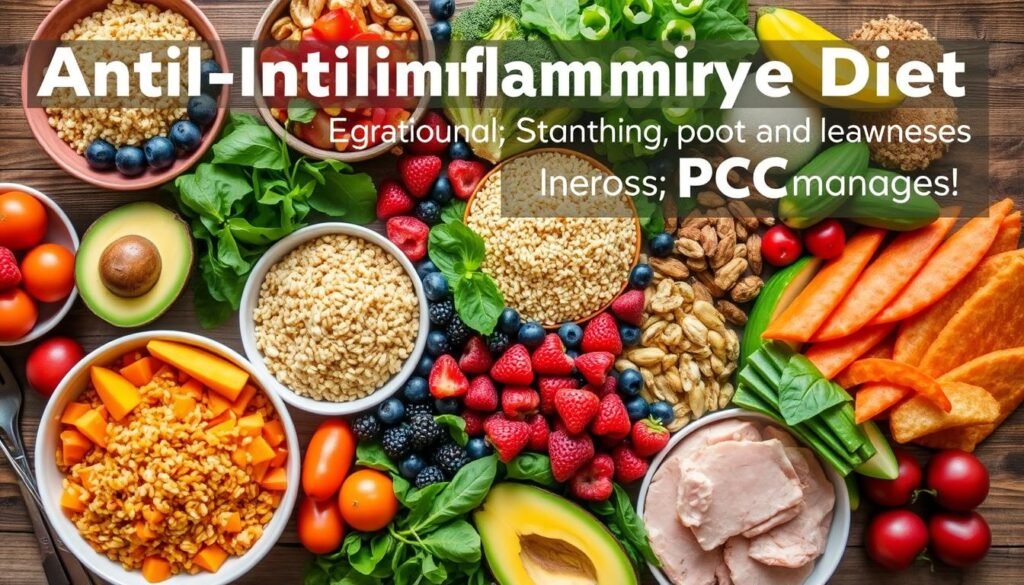About 1 in 10 women in their childbearing years has Polycystic Ovary Syndrome (PCOS). Many don’t know they have it, as up to 70% of cases go undiagnosed. Inflammatory PCOS is a major subtype, which can cause lots of symptoms and health problems. Knowing how to manage it is key to feeling better.
This piece looks at how inflammation and PCOS are connected. It covers ways to deal with symptoms. By getting the hang of inflammatory PCOS and making the right changes in life, eating habits, and treatment, you can take charge of your health.
Key Takeaways
- Inflammatory PCOS affects around 1 in 10 women of childbearing age.
- A significant percentage of those with PCOS remain undiagnosed.
- Effective management of symptoms can improve quality of life.
- Inflammation is a key factor in hormonal imbalance associated with PCOS.
- Proactive lifestyle changes play a vital role in managing inflammatory PCOS.
Understanding PCOS and Its Connection to Inflammation
Polycystic Ovary Syndrome, or PCOS, affects many women during their childbearing years. It’s seen in 6% to 20% of these women. This condition leads to hormonal imbalances, affecting how the ovaries function.
Inflammation plays a big role in PCOS. Studies show that women with PCOS have high levels of inflammation. This includes increased C-reactive protein (CRP) and tumor necrosis factor-alpha (TNF-α). These markers indicate chronic inflammation, which links to insulin resistance and obesity.
Chronic inflammation can mess with metabolic health and reproduction. Around 30% of women with PCOS have visceral fat, which is tied to insulin resistance. This kind of fat and inflammation raises the risk of serious health issues.
To diagnose PCOS, doctors look for certain signs. They use the Rotterdam criteria. This requires two out of three conditions: irregular ovulation, high male hormones, or specific findings on an ultrasound. It highlights how hormonal imbalances and inflammation are connected in PCOS.
Knowing more about PCOS and inflammation helps women and doctors. It helps them create better treatment plans. These plans target hormonal issues and the inflammation tied to PCOS.
| Inflammatory Marker | Typical Level in Women with PCOS | Associated Health Risks |
|---|---|---|
| C-reactive protein (CRP) | High levels above 5 | Cardiovascular disease, insulin resistance |
| Tumor necrosis factor-alpha (TNF-α) | Increased | Inflammation, metabolic dysfunction |
| Interleukin-6 (IL-6) | Elevated | Chronic inflammation, obesity |
What is Inflammatory PCOS?
Inflammatory PCOS looks at how chronic inflammation and hormone issues are linked. It’s key to understand that this condition is marked by ongoing inflammation found in many with the syndrome. Studies show that women with PCOS often have higher inflammation markers than those without.
Defining Inflammatory Polycystic Ovary Syndrome
Inflammatory PCOS affects women showing both PCOS symptoms and high chronic inflammation levels. This happens even in women of normal weight, not just those who are obese. It stands as a distinct feature impacting hormones and metabolic wellness.
How Inflammation Affects Hormonal Balance
The relationship between inflammation and hormones makes PCOS complex. Chronic inflammation can make the body resist insulin, affecting 50-70% of women with PCOS. This issue, along with high levels of cytokines like TNF-α, disrupts hormone balance.
Irregular periods and high androgen levels are common symptoms. This increased inflammation can lead to more metabolic issues, hurting health over time.
Keeping an eye on health indicators like weight and BMI helps manage inflammation. For better health management tips, consider monitoring weight and BMI. Recognizing inflammatory markers’ role in PCOS sheds light on helpful treatments.
Common Symptoms of Inflammatory PCOS
The symptoms of inflammatory PCOS can affect daily life a lot. Knowing these signs early helps with getting the right help.
Irregular Menstrual Cycles
One key sign of inflammatory PCOS is menstrual cycle irregularity. Women may have cycles that are too long, too short, or missing. This issue can be very upsetting. It’s important to watch out for changes and talk to a doctor if they happen.
Signs of Hirsutism and Acne
Another common problem is hirsutism. This means having too much hair in areas where men usually grow hair. Many women also struggle with acne, which is often due to high androgen levels. It’s important to deal with these issues early to feel better.
Weight Gain and Thinning Hair
Weight gain and thinning hair are also big concerns for those with inflammatory PCOS. Gaining weight can make other symptoms and risks worse, like insulin resistance. Taking care of these issues is key for good health. For more info on dealing with these problems, check out PCOS symptoms.
| Symptom | Impact |
|---|---|
| Irregular Menstrual Cycles | Indicates hormonal imbalance, often leading to fertility issues. |
| Hirsutism | Causes discomfort and self-esteem concerns. |
| Acne | Can lead to emotional distress and scarring. |
| Weight Gain | Increases risks for diabetes and cardiovascular diseases. |
| Thinning Hair | May affect self-image and confidence. |
Causes of Inflammatory PCOS
We look into what causes inflammatory PCOS by examining different key elements. This syndrome stems from genes, how we live, and our environment. These factors create big hormone changes. It’s important to know this for better management.
The Role of Hormonal Imbalances
Hormone imbalances are a big reason for inflammatory PCOS. High levels of androgens mess up periods and cause issues like hair growth and acne. These problems usually come from genetics mixed with stress, affecting women’s health.
Understanding Insulin Resistance
Insulin resistance plays a big role in inflammatory PCOS. It happens when the body ignores insulin, causing more insulin and hormone problems. This cycle makes inflammation worse, making PCOS harder to handle.
Diagnostic Tools for Inflammatory PCOS
When diagnosing inflammatory PCOS, a variety of diagnostic tools for PCOS are used. They give a clear view into the patient’s health. It starts with a detailed history and a physical exam. During these initial steps, doctors look for things like unusual menstrual cycles, excessive hair growth, and acne.
Blood tests are key in diagnosing. They check for inflammatory markers like C-reactive protein (CRP) and white blood cell counts. These tests show how inflammation is linked to insulin resistance, common in PCOS patients.
Imaging tests, like transvaginal ultrasounds, are also crucial. They look at the ovaries for cysts. These tests are important for making the diagnosis clear.
Finding PCOS involves looking at different signs, tests, and images. There’s not just one test that can tell if someone has it. Tests for hormones and pelvic exams help get a full understanding of a woman’s reproductive health. Learn more about the process here.
| Diagnostic Tool | Purpose |
|---|---|
| Blood Tests | Measure hormone levels and inflammatory markers |
| Transvaginal Ultrasound | Visualizes ovarian structure and follicle presence |
| Pelvic Exam | Checks reproductive organs for abnormalities |
| Hormonal Assessments | Evaluates levels of testosterone, insulin, and other hormones |
By diagnosing inflammatory PCOS correctly, we can start the right treatments. This improves the patient’s life and health.
Complications Associated with Inflammatory PCOS
Understanding inflammatory PCOS is key to knowing its wider impacts on health. Hormonal imbalances and ongoing inflammation can cause many serious problems. This shows why managing the condition is so important.
Infertility Risks
About half of the women with inflammatory PCOS struggle with getting pregnant for the first time. Another 25% might have issues trying for another child. The condition’s constant inflammation messes with how the ovaries work. This makes getting pregnant more challenging.
Link to Type 2 Diabetes
The connection between inflammatory PCOS and type 2 diabetes is alarming. Research finds that more than half of these women might develop diabetes by 40. Insulin resistance, common in PCOS, makes this risk worse. Knowing this helps in seeking early action and making lifestyle changes to possibly avoid diabetes.
Increased Heart Disease Risk
Inflammatory PCOS raises the risk for heart disease too. These women often have issues like high blood pressure and abnormal cholesterol levels. The increased inflammation can worsen these heart risk factors. It’s crucial to keep an eye on these issues and take steps to stay healthy.
For anyone looking to tackle complications of inflammatory PCOS, living healthier and getting medical advice are key. These steps help lower the risks mentioned above.

| Complication | Prevalence | Management Strategies |
|---|---|---|
| Infertility | 50% primary, 25% secondary | Hormonal treatments, lifestyle changes |
| Type 2 Diabetes Risk | Over 50% by age 40 | Dietary adjustments, regular monitoring |
| Heart Disease Risk | Higher prevalence of classic factors | Regular health screenings, lifestyle modifications |
Managing Inflammatory PCOS Symptoms
Dealing with inflammatory PCOS means making changes to how you live. Focus on lifestyle shifts to balance hormones and lower inflammation. Eating right, staying active, and managing stress are key.
Lifestyle Changes and Their Impact
Making lifestyle changes can greatly improve life for women with PCOS. Eat a diet full of antioxidants to fight inflammation. Focus on whole foods like fruits, veggies, lean meats, and good fats. Doing this led to better cholesterol levels, weight loss, and less inflammation for many.
Importance of Exercise
Exercise benefits those with PCOS in big ways. Aerobic and strength workouts improve insulin use and cut fat. Just a bit of exercise can help balance hormones and fight off inflammation. It also reduces CRP levels, a sign of inflammation in PCOS patients.
Dietary Strategies: Anti-Inflammatory Diet for PCOS
An anti-inflammatory diet for PCOS is key to managing symptoms and improving health. It helps reduce inflammation and balances hormones, aiding in better overall wellbeing.
Foods to Include in Your Diet
Choosing nutrient-rich foods is important for those on an anti-inflammatory diet for PCOS. The Mediterranean diet is often suggested because it focuses on healthy foods. Include the following in your diet:
- Omega-3 rich fish such as salmon and sardines
- Olive oil for healthy fats
- Legumes like lentils and chickpeas
- Non-starchy vegetables, including spinach, broccoli, and bell peppers
- Whole grains such as quinoa and brown rice
- Whole fruits, especially berries and apples
- Low-sugar beverages, including herbal teas and water
Foods to Avoid to Manage Inflammation
Avoiding certain foods is crucial for managing PCOS inflammation. These foods can worsen symptoms and increase the risk of diseases like heart disease and diabetes. Stay away from these:
- Fried foods and saturated fats
- Red meat and processed meats
- Processed snacks full of sugars
- Sugary drinks like soda and energy drinks
- Alcoholic beverages
- Refined flour products
- White rice and other high-glycemic index foods

Eating a balanced diet that avoids inflammatory foods is crucial. Even losing 5% to 10% of body weight can vastly improve PCOS symptoms. This includes better menstrual cycle regulation and reproductive health. Adopting these dietary strategies is a vital step in managing PCOS.
Natural Anti-Inflammatories for PCOS Management
Natural anti-inflammatories are key for handling PCOS, especially when fighting inflammation. Adding supplements like omega-3s, vitamin D, and curcumin can cut down inflammation. They also help balance hormones. This boosts overall health and well-being.
- Omega-3 fatty acids lower inflammation and better insulin sensitivity.
- Vitamin D helps fix hormonal imbalances in PCOS patients.
- Turmeric fights inflammation, helping with pain and menstrual cycles.
To manage PCOS symptoms, holistic strategies matter too. Exercise regularly, mixing aerobic and strength workouts three to five times a week. This can really help with the pain from hormonal changes.
Yoga and Pilates are good too. They’re stretching exercises that make muscles relax. This eases PCOS symptoms further.
What you eat is crucial for controlling inflammation. A diet with complex carbs, proteins, and fats rich in antioxidants is good. It helps with hormone regulation too. Adding lots of fiber improves your metabolic health.
Finding ways to reduce stress, like mindfulness, is also helpful for those with PCOS. Always talk to a doctor before trying new supplements or big lifestyle changes. This ensures the safe and effective use of natural anti-inflammatories for PCOS.
Medical Treatments for Inflammatory PCOS
Dealing with inflammatory PCOS involves using medical treatments for PCOS. These aim to reduce symptoms and boost overall health. Treatments vary, but they often include hormone therapies and drugs that improve insulin response. Many doctors suggest hormonal therapies, like birth control, to regulate periods and cut down on male hormones. This can lessen issues like unwanted hair growth and acne.
Metformin is another common choice. This insulin-sensitizing agent helps with insulin sensitivity and weight control. Being overweight is a problem for many with PCOS, so weight control is a key part of treatment. Lifestyle changes, like more exercise and better eating, are also shown to help a lot.
| Treatment Type | Purpose | Examples |
|---|---|---|
| Hormonal Therapies | Regulate menstrual cycles and reduce androgens | Birth control pills, Aldactone (spironolactone) |
| Insulin-Sensitizing Agents | Improve insulin sensitivity and manage weight | Metformin, Inositol |
| Fertility Treatments | Induce ovulation | Letrozole, Clomiphene citrate |
Letrozole works better than clomiphene for PCOS-related infertility. Clomiphene still helps, leading to pregnancy in some cases. But, we must watch out for side effects like enlarged ovaries.
Using both medical treatments for PCOS and changing lifestyle habits is most effective. This dual approach gives women the best chance at better health and having a baby.

Conclusion
In summary, dealing with inflammatory PCOS requires a well-rounded approach. People can manage their symptoms better by understanding how inflammation affects their hormones. Insulin resistance is key in this condition, highlighting the need for specific ways to help.
Life changes, such as exercising and choosing what to eat carefully, can improve symptoms. Knowing about risks like type 2 diabetes helps people take charge of their health. New research and treatments offer hope for a better future for those with inflammatory PCOS.
Treating this condition well means using medicine, making lifestyle changes, and getting support. This way, individuals can feel better about their health. Knowing they’re not alone gives them strength on their path to wellness.